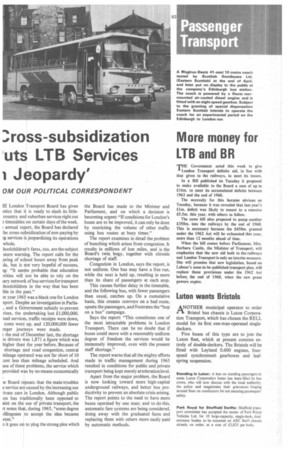I;ross-subsidization
Page 65

If you've noticed an error in this article please click here to report it so we can fix it.
uts LTB Services
Jeopardy'
OM OUR POLITICAL CORRESPONDENT
EE London Transport Board has given otice that it is ready to slash its littlecountry and suburban services right out timetables on certain days of the week. ; annual report, the Board has declared :he cross-subsidization of non-paying by ig services is jeopardizing its operations whole.
hoolchildren's fares, too, are the subject stern warning. The report calls for the ,ering of school hours away from peak ds, but is not very hopeful of success, "It seems probable that education mities will not be able to rely on the iary network of bus services for transport :hoolchildren in the way that has been ible in the past."
le year 1965 was a black one for London sport. Despite an investigation in Parlia, and a Government subsidy to prevent rises, the undertaking lost £1,000,000. oad services, traffic receipts were down, costs were up, and 120,000,000 fewer mger journeys were made.
t the end of December last, the shortage is drivers was 1,871 a figure which was higher than the year before. Because of shortage and road congestion, central nileage operated was not far short of 10 ;ent less than mileage scheduled. And use of these problems, the service which provided was by no means economically le Board repeats that the main troubles e service are caused by the increasing use ivate cars in London. Although public on has traditionally been opposed to aint on the use of private transport, the rt notes that, during 1965, "some degree tillingness to accept the idea became rent."
D it goes on to plug the strong plea which
the Board has made to the Minister and Parliament, and on which a decision is becoming urgent: "If conditions for London's buses are to be improved, it can only be done by restricting the volume of other traffic using bus routes at busy times."
The report examines in detail the problem of bunching which arises from congestion. It results in millions of lost miles, and is the Board's twin bogy, together with chronic shortage of staff.
Congestion in London, says the report, is not uniform. One bus may have a free run, while the next is held up, resulting in more than its share of passengers at each stop.
This causes further delay in the timetable, and the following bus, with fewer passengers than usual, catches up. On a cumulative basis, this creates convoys on a bad route, upsets the passengers, and frustrates the "hop on a bus" campaign.
Says the report: "This constitutes one of the most intractable problems in London Transport. There can be no doubt that if buses could move with a reasonably uniform degree of freedom the services would be immensely improved, even with the present staff shortage."
The report warns that all the mighty efforts made in traffic management during 1965 resulted in conditions for public and private transport being kept merely attolerationlevel.
Apart from the major problem, the Board is now looking toward more high-capital underground railways, and better bus productivity to prevent an absolute crisis arising. The report points to the need to have more buses operated by one man; and to do this, automatic fare systems are being considered, doing away with the graduated fares and replacing them with others more easily paid by automatic methods.




















































































































































